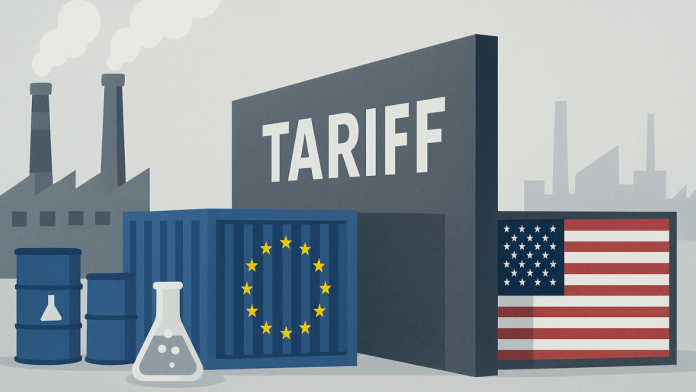Europe’s chemical producers are facing another storm. The industry, one of the European Union’s largest exporters, is being hit hard by new U.S. import tariffs. These taxes, set at a minimum of 15%, are aimed at goods coming from the EU. For chemical companies, this comes at the worst possible time.
The sector has only just been trying to recover from the energy crisis of 2022. Back then, gas and electricity prices soared after war broke out in Ukraine. Factories across Europe struggled with record-high costs, forcing some to cut jobs or even shut down sites.
Chemicals are the EU’s fourth-biggest export after machinery, cars, and medicines. The industry is worth more than 655 billion euros. But even before the new tariffs, demand had already been slowing down in key industries. Customers in automotive, machinery, and consumer goods were ordering less, leaving producers with falling sales and squeezed profits.
Now, U.S. tariffs are hitting many of those same customers. Car makers and equipment producers are under pressure, and that has a direct impact on chemical suppliers. The new trade barrier has made buyers even more cautious, and many are delaying orders.
Analysts such as Thomas Schulte-Vorwick of Metzler Research note that the mix of tariffs, high costs, and fierce Asian competition has created “a pretty toxic combination.”
India joins Malabar naval drill with US Japan and Australia in Guam as tariff issues continue
Falling Orders and Shrinking Profits
In recent months, several large chemical companies have adjusted their business outlooks. BASF, the world’s biggest chemical producer, cut its full-year forecast in July. The group said many customers are now placing orders only weeks ahead instead of the usual three to four months, making long-term planning more difficult.
Brenntag, a leading distributor, also raised red flags. CEO Christian Kohlpaintner warned that cheaper chemicals from China could soon flood Europe if Beijing’s exporters redirect products away from the U.S. to avoid tariffs.
Profits across the industry have taken a hit. Data shows that third-quarter earnings for Europe’s chemical sector are expected to fall by 5%, following a steep 22% drop in the second quarter. Christian Faitz of Kepler Cheuvreux described the slowdown as “sequential,” adding that the weakness has been visible throughout 2024.
The situation is made worse by global competition. Chinese suppliers, facing possible higher levies in the United States, may redirect their chemicals to Europe. That could flood the market with cheaper products, putting even more pressure on local producers.
Currency swings have added more stress. Akzo Nobel, the Dutch paint maker, lowered its 2025 profit outlook, citing exchange rate effects and weak demand. German group Wacker Chemie also cut its forecast, blaming the weak dollar and slowing orders for products like polysilicon, which is used in solar panels.
Three in five Americans reject tariffs as costs rise, according to new polling
Strain on Big and Small Companies
The biggest names in Europe’s chemical industry, including BASF, Brenntag, and Lanxess, have strong presences in the U.S. market. This gives them some protection from the direct impact of tariffs. Still, these giants are seeing cautious customer behavior and slower sales. Lanxess CEO Matthias Zachert recently warned of “terrible uncertainty” for the sector.
Smaller and mid-sized producers face a tougher battle. Hobum Oleochemicals, a family-owned specialty chemicals maker, lost a potential U.S. client near Detroit after the new tariffs triggered uncertainty. CEO Arnold Mergell called the lack of reliability “poison for projects and investments.”
The EU exported around 40 billion euros worth of chemicals to the United States last year, slightly higher than the year before. But with tariffs now in place, that number could decline. At the same time, the EU imported about 30 billion euros worth of chemicals from the U.S., showing how deeply connected the two markets are.
The chemical industry in Europe earns around a third of its sales abroad, making it highly dependent on global trade. But the balance is changing. For years, Europe produced and exported large amounts of chemicals worldwide. Now, with higher costs, uncertain demand, and trade barriers, that role is shifting. Arne Rautenberg of Union Investment observed that Europe may no longer remain the export powerhouse it once was.
Industry leaders have warned that the constant uncertainty is stifling investment. Without reliability, companies find it hard to commit to new projects or long-term deals. This creates more pressure in an already fragile sector.


